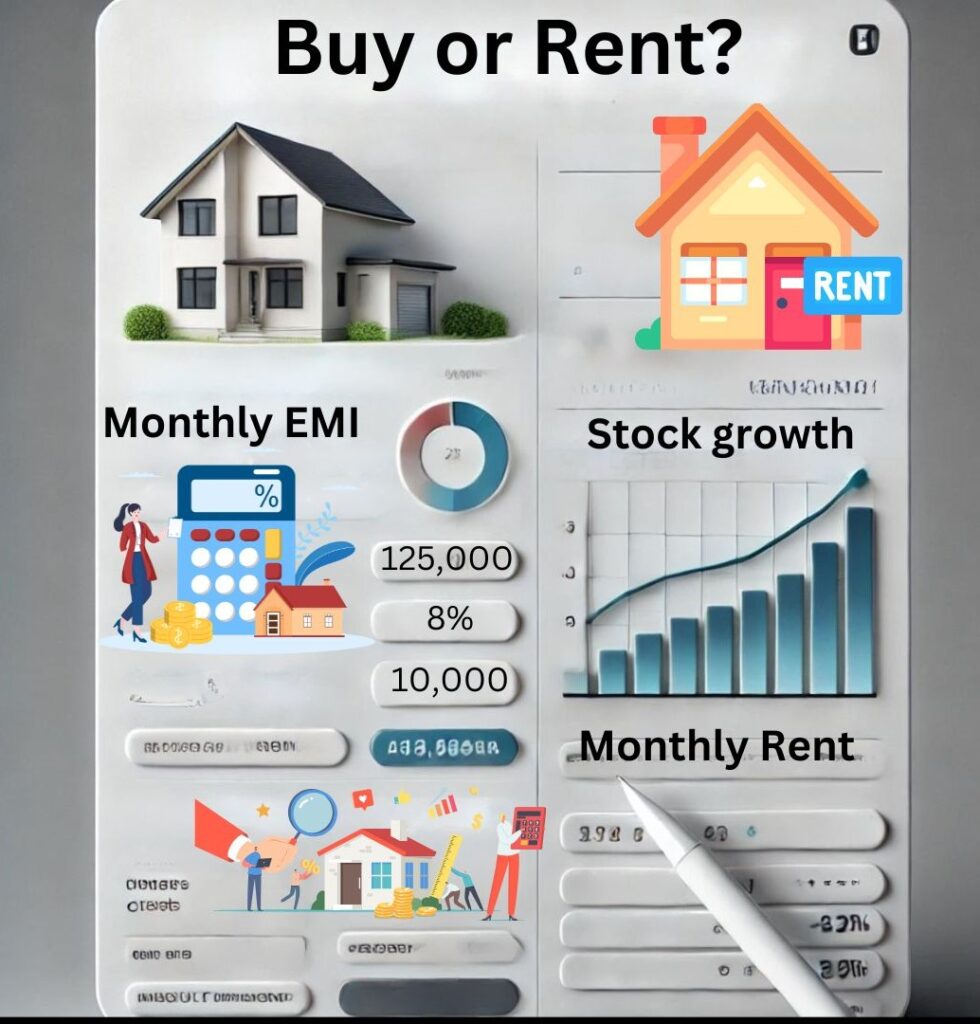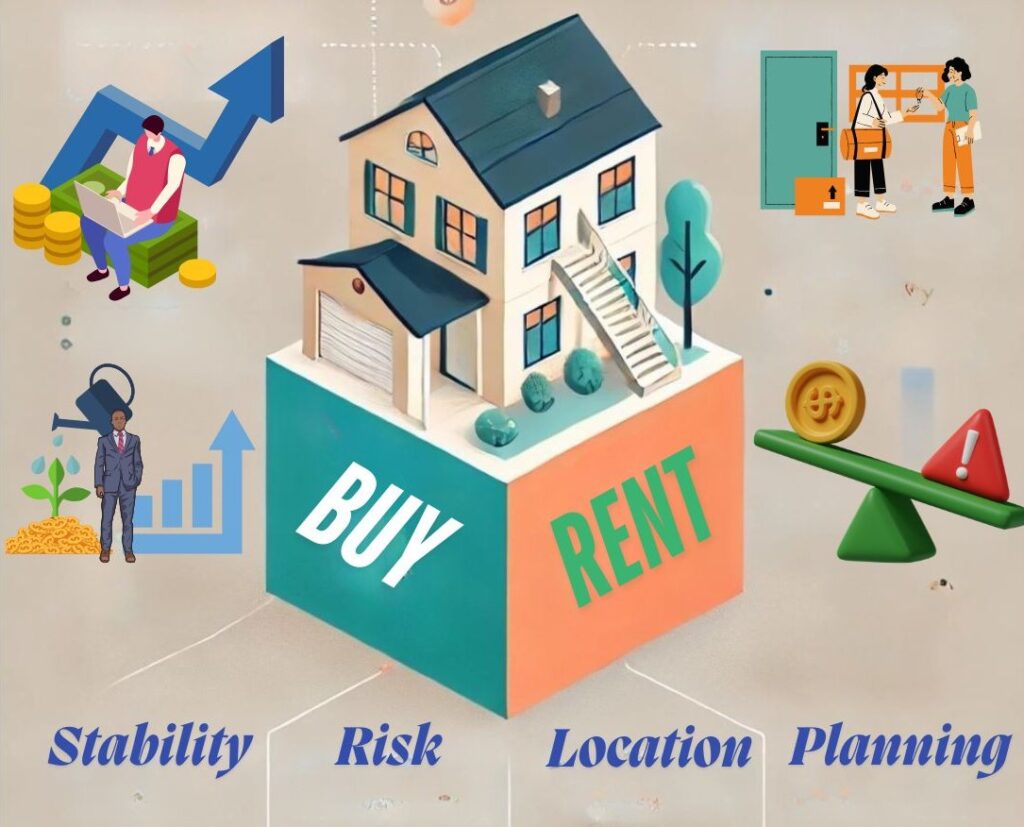Introduction: The Million-Dollar Question
Amit and Priya, a young couple in Bangalore, face a dilemma: “Should we buy a house or keep renting?”
Their rented 2BHK in Whitefield costs ₹35,000 per month. But they dream of owning a 3BHK worth ₹1.2 crore. They wonder: Are we throwing away money on rent, or is buying too big a commitment?
Similarly, Rajesh, a marketing professional in Mumbai, recently moved into a rented apartment in Andheri for ₹50,000 per month. He has the option to buy a ₹2 crore flat in the same area but worries about taking on a massive loan. With his job requiring frequent travel, he questions whether homeownership aligns with his lifestyle.
Is it better to Buy or Rent a house in India? This is a question most Indians grapple with. Traditionally, homeownership was a major milestone. However, today’s real estate market, high interest rates, and lifestyle preferences have made renting an equally attractive option.
To make this discussion more engaging, let’s dive into real-life case studies, financial breakdowns, and expert insights to determine whether buying or renting makes the most sense in India’s current market. This article provides a detailed analysis of rent vs. buy decisions in Indian real estate, along with a rent vs. buy calculator for India, helping you make the right choice.
Buy or Rent: Why This Debate Matters in India
Why Buying a Home Was Always the “Indian Dream”

Homeownership holds a profound cultural significance in India, symbolizing stability, security, and social status. Our parents and grandparents viewed renting as a waste of money. For them, buying property was an investment in security, social status, and financial stability.
Why Renting Is Now Gaining Popularity

With rising property prices, uncertain job markets, and increased mobility, young professionals now question homeownership. Renting offers flexibility and lower financial commitment—a major plus in an unpredictable economy.
Data & Trends:
- Housing affordability is declining. The average price-to-income ratio in India’s metro cities is over 7:1, making homeownership unaffordable for many. Refer JLL India’s Home Purcahse Affordability Index for details.
- Rental yields remain low. Most cities have rental yields of 2-3%, meaning renting can be a smarter choice financially.
- Young professionals prioritize flexibility. Millennials and Gen Z prefer renting to avoid long-term financial burdens.
Analysis on Rent vs Buy Decisions in Indian Real Estate
Understanding the financial and practical implications of buying vs. renting in India requires an in-depth look at market trends, economic factors, and personal financial goals. Various studies indicate that while homeownership provides long-term security, renting allows for better financial agility and investment opportunities. This section explores the crucial elements influencing the decision-making process.
Before making a decision, consider these critical factors:
Financial Stability
✔ Buying requires a large down payment (20-25% of the property value).
✔ Renting allows higher liquidity for investments.
Property Prices vs. Rental Costs
✔ In cities like Mumbai and Bangalore, high property prices make renting more viable.
✔ In Tier-2 and Tier-3 cities, homeownership can be more affordable. Refer Numbeo’s Property Prices Index by City.
Long-Term Plans & Career Growth
✔ If you plan to stay in one city for 10+ years, buying makes sense.
✔ If you expect frequent job relocations, renting offers flexibility.
✔ For professionals who frequently travel for work or attend international conferences, renting offers greater flexibility. Learn how to secure a travel grant for international conferences to fund your trips.
Loan Interest Rates & EMI Burden
✔ Home loan interest rates in India range between 7.5% to 9%.
✔ A ₹ 1 crore loan for 20 years at 8% interest leads to an EMI of ₹83,644 per month—higher than typical rent.
Financial Analysis: The Real Cost of Buying vs. Renting
Let’s break it down with numbers:
| Scenario | Buying (20 years) | Renting (20 years) |
| Property Price | ₹1 crore | – |
| Down Payment | ₹20 lakh | – |
| Home Loan EMI | ₹66,911/month | ₹35,000/month |
| Total Cost (20 years) | ₹1.8 crore (EMIs + down payment) | ₹84 lakh (assuming 5% yearly rent increase) |
Renting saves money upfront and provides investment flexibility. Buying gives you an asset but requires high initial costs. Refer Reuters’ insights on projected home price increases in India for more details.
Beyond the numbers, here’s a side-by-side comparison of the key factors that influence the buy or rent decision in India.
| Factor | Buying | Renting |
| Upfront Cost | High (down payment, registration fees, etc.) | Low (security deposit, advance rent) |
| Monthly Expense | EMI payments, maintenance, property taxes | Monthly rent, maintenance (if applicable) |
| Financial Flexibility | Low (money tied in property) | High (capital available for investments) |
| Long-Term Investment | Builds equity, appreciates over time | No asset creation, ongoing expense |
| Mobility | Limited (hard to relocate frequently) | High (easy to move cities or upgrade) |
| Maintenance | Owner responsible for repairs | Landlord handles major repairs |
| Risk Factor | Market fluctuations can affect value | No risk of property devaluation |
This table provides a clear side-by-side comparison to help readers make an informed decision.
Rent vs Buy Calculator India: A Smart Way to Decide

A Data-Driven Approach to Buying vs. Renting
To make an informed decision, real estate analysts often rely on the Buy-to-Rent Ratio, a widely used metric that compares the cost of purchasing a property to the cost of renting a similar unit annually.
Buy-to-Rent Ratio = Home-Price / Annual-Rent
If the ratio is < 15, buying is generally a good option as the property is priced reasonably in comparison to rental returns.
If the ratio is > 20, renting is often the better financial decision as the cost of ownership outweighs rental expenses.
Illustrative Example:
- Property Price: ₹1 crore
- Annual Rent: ₹4.2 lakhs (₹35,000 × 12)
- Buy-to-Rent Ratio: 23.8
Verdict: Renting is the better financial choice in this scenario!
Why This Matters?
According to market studies, cities like Mumbai, Delhi, and Bangalore often have high Buy-to-Rent ratios exceeding 25, indicating that renting is financially more viable in these locations. Conversely, in Tier-2 and Tier-3 cities, the ratio often falls below 15, making homeownership a more attractive investment.
However, these statistics are not universal, and several factors—such as job stability, lifestyle preferences, future financial goals, and market fluctuations—can influence whether buying or renting is the better choice. Prime neighborhoods with premium amenities may favor renting due to high ownership costs, while emerging localities with strong growth potential could make buying a more attractive investment.
Additionally, online rent vs buy calculator provides an even more personalized analysis by factoring in loan interest rates, property appreciation, and opportunity cost of capital. Homebuyers and renters should leverage these tools to conduct a thorough financial comparison before making a commitment.
Before deciding whether to rent or buy, analyze the Buy-to-Rent ratio in your target city and complement it with an online calculator to assess the financial viability of homeownership.
Real-Life Case Studies: Buyers vs. Renters

Case Study 1: The Homebuyer
🔹 Rohit (35), IT Professional, Mumbai
🔹 Bought a ₹3 crore apartment in a residential complex in Thane, taking a ₹2.5 crore loan with a 25-year tenure.
🔹 Pays ₹2.1 lakh EMI/month, which constitutes nearly 55% of his monthly income.
🔹 Additional expenses include ₹25,000 monthly maintenance charges, ₹60,000 annual property tax, and periodic renovation costs.
🔹 The area has seen a moderate appreciation of around 4% per year, but due to high upfront costs, his net wealth growth has been slower compared to diversified investments.
🔹 Struggles with high financial pressure, limiting his ability to invest in stocks, mutual funds, or business ventures.
✅ Enjoys a premium lifestyle with access to top-notch amenities and a prestigious address.
✅ Feels a strong sense of security and pride in homeownership.
❌ The massive EMI burden restricts his career mobility, making it harder to switch jobs or take risks in his profession.
❌ Faces liquidity challenges as most of his wealth is tied up in real estate.
Case Study 2: The Renter
🔹 Neha (30), Marketing Manager, Bangalore
🔹 Rents a ₹60,000/month apartment in a prime location near Indiranagar, giving her easy access to work and lifestyle amenities.
🔹 Instead of taking a home loan, she invests ₹50,000/month in a mix of equity mutual funds, stocks, and fixed deposits, generating an average annual return of 12%.
🔹 Her investment portfolio has grown by ₹30 lakhs over the past five years, outpacing real estate appreciation in her city.
🔹 She is considering relocating abroad for better career prospects, an option that would have been difficult if she had purchased a home.
✅ Enjoys financial flexibility and the ability to relocate as needed.
✅ Has built a strong investment portfolio without the burden of a home loan.
❌ No long-term asset creation in real estate, which could be a missed opportunity if prices surge in the future.
Hidden Costs of Buying a Home
When purchasing a home, buyers often overlook the hidden costs that go beyond the property price and loan EMIs. These additional expenses can significantly impact long-term affordability and should be factored into any financial planning.
Stamp Duty & Registration Fees
One of the largest upfront costs, stamp duty and registration fees vary by state (5-10%) and can add significantly to the purchase price. Many first-time buyers underestimate these expenses, leading to financial strain.
Property Tax & Maintenance Charges
Homeowners must pay annual property taxes, which vary based on location and municipal regulations. Additionally, maintenance costs, especially in gated communities and high-rise apartments, can escalate over time, adding a recurring financial burden.
Home Loan Interest Costs
Over a 20-25 year tenure, interest payments on a home loan can often exceed the principal amount. For example, a ₹1 crore home loan at 8% interest for 20 years results in total interest payments of around ₹98 lakhs—almost doubling the cost of the home.
Interior & Renovation Expenses
Unlike renting, homeownership comes with customization and furnishing costs. Initial renovations, furniture, and ongoing upkeep (painting, repairs, etc.) can add 10-15% to the total cost.
Liquidity Constraints & Opportunity Cost
Real estate is an illiquid asset, meaning it takes time to sell in case of financial emergencies. The capital locked in homeownership could have been invested in high-return assets such as stocks or mutual funds.
Understanding these hidden costs is crucial for potential buyers. While homeownership offers security and potential appreciation, it also requires careful financial planning to ensure long-term affordability and sustainability.
The Psychological and Lifestyle Aspects
Buying Offers
✔ Emotional security and a sense of long-term financial commitment.
✔ Stability for families, ensuring children grow up in a permanent home and reducing the hassle of frequent relocations.
✔ The ability to personalize and modify the living space without restrictions from a landlord.
✔ A potential source of passive income if the property is rented out in the future.
✔ A hedge against inflation, as property values generally increase over time, protecting homeowners from rising rent costs.
Renting Offers
✔ Freedom & flexibility, allowing individuals to move cities for career opportunities without being tied down.
✔ No debt stress, making it easier to manage finances and invest in other high-return opportunities like stocks or businesses.
✔ Lower upfront costs, as renting does not require a massive down payment, registration fees, or home loan EMIs.
✔ Reduced financial risk, especially in uncertain economic times where job security might be a concern.
✔ Easier access to premium locations, as renting in prime areas is often more affordable than buying.
Final Verdict: Is It Better to Buy or Rent a House in India?

After analyzing multiple financial models, real estate trends, and personal case studies, it is evident that there is no one-size-fits-all answer. The decision ultimately hinges on your financial goals, lifestyle aspirations, and market conditions.
Both renters and homeowners have been observed to succeed when their choices are aligned with well-planned financial strategies. Here’s a structured breakdown of what works best for different scenarios:
Buy if you seek long-term stability, asset creation, and tax benefits. Real estate has historically been a wealth-building tool, especially if purchased in a high-growth location. Buying is ideal for individuals planning to stay in a particular city for over a decade, looking to build equity, and willing to handle property maintenance and taxes.
Rent if you prioritize financial flexibility, mobility, and investment growth outside of real estate. Renting allows individuals to allocate capital toward higher-yielding investments, such as equity markets, while avoiding the financial burden of a large mortgage. This option is best suited for professionals who expect frequent job relocations, entrepreneurs who need liquidity, and those looking to avoid long-term debt obligations.
Additionally, macroeconomic factors such as interest rates, rental yield trends, and market supply-demand dynamics should be considered. In a city where rental yields are below 3%, renting may be the smarter choice, whereas in locations with high capital appreciation potential, buying could be the winning strategy.
Ultimately, real estate decisions should be made with both financial logic and lifestyle aspirations in mind. Evaluate your affordability, market trends, and long-term plans before making your move.
What’s your choice? Let us know in the comments!
Conclusion
The debate over whether to buy or rent a house in India is a complex one, shaped by economic trends, personal financial health, and long-term goals. Both options come with distinct advantages and challenges, making it essential to approach the decision with thorough research and a strategic mindset.
Buying a home provides long-term stability, equity building, and potential appreciation, but it also demands substantial upfront investment, ongoing maintenance, and financial commitment. On the other hand, renting offers greater flexibility, lower financial risk, and the opportunity to invest capital elsewhere, yet it lacks asset accumulation and long-term security.
Market dynamics such as rental yields, mortgage rates, and urban development trends should also play a crucial role in this decision. A sound financial strategy must consider factors like affordability, liquidity, and career aspirations to determine the most suitable path.
Ultimately, the best choice depends on aligning your decision with your financial goals, lifestyle needs, and risk tolerance. Carefully weigh your options, analyze the costs, and plan strategically to make the most informed decision for your future.
Share this article with someone debating this decision!
Need help making a decision? Drop a comment below!
Frequently Asked Questions (FAQs)
Q. Is renting always cheaper than buying in India?
A. Not necessarily. In some Tier-2 cities where home prices are more affordable, buying can be cost-effective. However, in metro cities with high property prices, renting is often the cheaper short-term option.
Q. How do I know if I should buy a house or continue renting?
A. Consider factors like financial stability, job security, long-term plans, and the buy-to-rent ratio. Use a buy or rent calculator to get a data-driven answer.
Q. What is the buy-to-rent ratio, and why does it matter?
A. The buy-to-rent ratio helps compare the cost of homeownership to renting. If the ratio is above 20, renting is often the better choice; if below 15, buying is more financially viable.
Q. Does buying a house in India offer tax benefits?
A. Yes, homebuyers can claim tax deductions under Section 80C and 24(b) on home loan interest and principal repayment, making homeownership more attractive for salaried individuals.
Q. Are there hidden costs in buying a home?
A. Yes. Apart from the property cost, buyers should account for stamp duty, registration fees, property taxes, maintenance, and renovation costs.
Q. What is the best age to buy a house in India?
A. There is no universal best age, but financial planners suggest buying between 30-40 years when individuals have stable careers and better financial security.
Q. Is real estate a good investment in India?
A. It depends on location and market trends. While metros offer lower rental yields, Tier-2 cities often provide better capital appreciation. Diversifying investments is recommended.
Need more insights? Leave a comment or consult a financial expert before making your decision!



